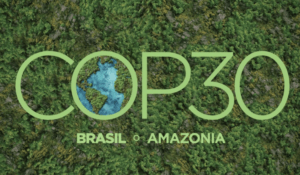Despite the EU’s unusually strong stance, the climate summit in Brazil ended with a weak, inconclusive agreement
The UN climate conference held in Belém, Brazil, at the mouth of the Amazon, ended with a one-day delay, but successfully. Although the package adopted under the name of the Mutirao Decision showed that even in the absence of the United States and amidst global challenges, the leaders of the countries can come together to take action against climate change, the text lacking specifics does not ensure that this will be done quickly enough. A quick analysis by Tibor Schaffhauser, an expert at the Green Policy Center, directly from Belém.
 This year’s climate conference of the UN Framework Convention on Climate Change, COP30, ended with a one-day delay, but ultimately with results in Belém, Brazil. The decision package, marked by the name of the indigenous people’s assembly, Mutirao, was only adopted after long delays.
This year’s climate conference of the UN Framework Convention on Climate Change, COP30, ended with a one-day delay, but ultimately with results in Belém, Brazil. The decision package, marked by the name of the indigenous people’s assembly, Mutirao, was only adopted after long delays.
The main debate took place between progressive and oil-producing countries, basically around three main topics. The campaign led by the European Union and small island states threatened by rising sea levels to phase out fossil fuels and adopt stronger emission reduction measures has met with strong resistance from oil monarchies and non-committal countries led by India. According to the latest reports released this year, we are currently unable to meet the temperature targets set in the Paris Agreement due to weak government commitments, which could pose serious risks in the form of more frequent extreme weather events.
Fossil lobbies and a stingy West
In contrast, the main theme of these same countries has been the series of attacks on the European Union’s carbon leakage mechanism, the so-called CBAM, as the mechanism obliges companies wishing to import into the EU market to meet the EU’s strict environmental requirements or pay a climate tax. In the eyes of countries with fossil energy resources, this EU climate protection measure is a red flag, which is why they are trying to attack it in every possible international forum, and climate protection negotiations are no exception. Thus, they tried to achieve the establishment of a system that would have jurisdiction over national trade policy measures. As more and more countries plan to set up similar climate protection systems, serious discussions surrounded the negotiations.
The third main point of discussion was, of course, the issue of money again. The theme of last year’s Baku climate conference was climate financing, where developed countries pledged to support developing countries’ climate protection measures with at least $300 billion annually from public sources from 2025, and to try to increase this amount to $1.3 trillion by 2035 by involving other private and development sources. So when a broad group of developing countries demanded a tripling of adaptation resources and expected developed countries to give them years in advance when they would mobilize the money, it naturally caused a serious headache for Western governments with weak budgets.
The Brazilian presidency was supposed to cut these Gordian knots amid continuous protests, fires and logistical challenges, but it seemed that the Latin American country did not necessarily want to move away from its national position and take on a neutral role. Thus, for a long time it seemed that it would not be possible to bridge the trenches between the countries.
A strong and tactical Europe appeared on the scene following the departure of the USA
Finally, after a one-day delay, the Parties managed to reach an agreement on a package containing several decisions during the closing session, which was fraught with interruptions and scandals. The European Union took an unusually strong stance in the negotiations, filling the void left by the US’s absence, and, with the tacit support of the Chinese government, strongly advocated for stronger emission reduction commitments. The EU even floated the idea of blocking the final package in order to ensure that steps to phase out fossil fuels and increase global emissions reduction ambition were included in the final decision.
In the end, developed countries partially gave in on financing and agreed to increase the proportion of adaptation contributions within the framework of the $300 billion Baku pledge, in exchange for which oil-producing countries backed away from setting up a new institutional system that also criticized the CBAM.
Related news
Amsterdam bans meat and fossil fuel advertising as part of fight against climate change
🎧 Hallgasd a cikket: Lejátszás Szünet Folytatás Leállítás Nyelv: Auto…
Read more >Related news
ZEW: Economic expectations worsened in Germany and the euro area in February
🎧 Hallgasd a cikket: Lejátszás Szünet Folytatás Leállítás Nyelv: Auto…
Read more >








